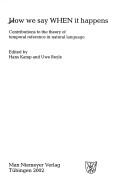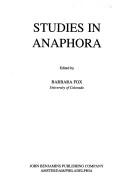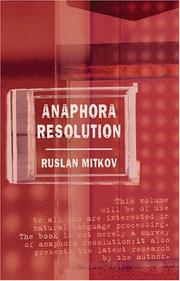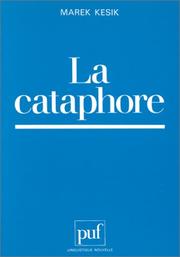| Listing 1 - 10 of 92 | << page >> |
Sort by
|
Book
ISBN: 9027260184 9027208395 9789027260185 9789027208392 Year: 2021 Publisher: Amsterdam Philadelphia
Abstract | Keywords | Export | Availability | Bookmark
 Loading...
Loading...Choose an application
- Reference Manager
- EndNote
- RefWorks (Direct export to RefWorks)
"This book, the first systematic exploration of the third person in English, German, and French, takes a fresh look at person reference within the realm of political discourse. By focusing on the newly refined speech role of the target, attention is given to the continuity between second and third grammatical persons as a system. The role played by third-person forms in creating and maintaining interpersonal relationships in discourse has been surprisingly overlooked. Until now, third-person forms have overwhelmingly been considered as referring to the absent, i.e. to someone outside the communication situation, other than the speaker or the hearer: the "nonperson". By broadening the scope and finally integrating the third person, we come to understand The Politics of Person Reference fully, and to see the strategic, argumentative, and dialogical nature of the act of referring to other discourse participants, understood as the act of creating new referents"--
Reference (Linguistics) --- Signification (Linguistics) --- Linguistics --- Onomasiology --- Semantics
Book
ISBN: 1316534626 1009365479 1107143470 9781316534625 9781107143470 1009365460 9781316507797 Year: 2023 Publisher: Cambridge, United Kingdom ;New York, NY Cambridge University Press
Abstract | Keywords | Export | Availability | Bookmark
 Loading...
Loading...Choose an application
- Reference Manager
- EndNote
- RefWorks (Direct export to RefWorks)
Referential expressions include terms such as determiners, proper names, noun phrases, pronouns, and all other expressions that we use to make reference to things, beings, or events. The first of its kind, this book presents a detailed, integrated account of typical and atypical uses of referential expressions, combining insights from discourse, cognitive, and psycholinguistic literature within a functional model of language. It first establishes a foundation for reference, including an overview of key influences in the study of reference, the debates surrounding (in)definiteness, and a functional description of referring expressions. It then draws on a variety of approaches to provide a comprehensive explanation of atypical uses, including referring in an uncollaborative context, indefinite expressions used for definite reference, reference by and for children, and finally metonymic reference with a special focus on metonymy in medical contexts. Comprehensive in scope, it is essential reading for academic researchers in syntax, discourse analysis, and cognitive linguistics.
Reference (Linguistics) --- Signification (Linguistics) --- Linguistics --- Onomasiology --- Semantics
Multi
ISBN: 9781107177574 110717757X 9781316822845 9781316628478 1316830071 1316822842 1316827763 Year: 2020 Publisher: Cambridge Cambridge University Press
Abstract | Keywords | Export | Availability | Bookmark
 Loading...
Loading...Choose an application
- Reference Manager
- EndNote
- RefWorks (Direct export to RefWorks)
Reference is a major theme in the study of language and language use. Providing a relevance-theoretic account of reference resolution, this book develops our understanding of procedurally encoded meaning by exploring its function and role in reference resolution. A range of referring expressions are discussed, including definite descriptions, demonstratives and pronouns. Existing work on the pragmatics of reference has largely focused on how reference is resolved. However, speakers can do much more than just secure reference when they use a referring expression. A speaker's choice of expression might communicate information about their attitudes and their emotions, and referring expressions can also be used to create stylistic and poetic effects. The analyses in this book widen the focus to consider these broader effects, and the discussions and arguments presented take seriously the idea that referring expressions can contribute to meaning and communication in a way that goes beyond reference.
Reference (Linguistics) --- Signification (Linguistics) --- Linguistics --- Onomasiology --- Semantics --- Pragmatics --- Psycholinguistics --- Reference (Linguistics). --- Language and linguistics.
Book
ISBN: 2130515479 9782130515470 Year: 2001 Publisher: Paris Presses universitaires de France
Abstract | Keywords | Export | Availability | Bookmark
 Loading...
Loading...Choose an application
- Reference Manager
- EndNote
- RefWorks (Direct export to RefWorks)
Lexicology. Semantics --- French language --- Anaphora (Linguistics) --- Anaphora (Linguistics). --- Cross-reference (Linguistics) --- Grammar, Comparative and general --- Linguistics --- Reference (Linguistics)
Book
ISBN: 0521227917 0521105714 0511753144 9780521227919 9780511753145 9780521105712 Year: 1980 Volume: 28 Publisher: Cambridge Cambridge University Press
Abstract | Keywords | Export | Availability | Bookmark
 Loading...
Loading...Choose an application
- Reference Manager
- EndNote
- RefWorks (Direct export to RefWorks)
Dr Thrane makes an original contribution to one of the central topics in syntax and semantics: the nature and mechanisms of reference in natural language. He makes a fundamental distinction between syntactic analyses that are internal to the structure of a language and analyses of the referential properties that connect a language with the 'outside world' - and therefore derive in some sense from common human capacities for perceptual discrimination. Dr Thrane argues that the failure to make this distinction and to attend separately to both kinds of analysis has vitiated previous general accounts of linguistic structure. The book focuses particularly on pronouns and on the role of determiners, quantifiers and other components of the noun phrase. Most of the data come from the modern Germanic languages, especially English, but Dr Thrane considers also the structural peculiarities of 'classifier languages' like Vietnamese. The book will be important for students of English language as well as for general linguists.
Lexicology. Semantics --- English language --- Reference (Linguistics) --- Semantics --- -Reference (Linguistics) --- 801.56 --- Signification (Linguistics) --- Linguistics --- Onomasiology --- Germanic languages --- Syntaxis. Semantiek --- Semantics. --- 801.56 Syntaxis. Semantiek --- Reference (Linguistics). --- Semasiology --- Arts and Humanities --- Language & Linguistics --- English language Semantics --- English language - Semantics

ISBN: 3484304553 9783484304550 Year: 2002 Volume: 455 Publisher: Tübingen Niemeyer
Abstract | Keywords | Export | Availability | Bookmark
 Loading...
Loading...Choose an application
- Reference Manager
- EndNote
- RefWorks (Direct export to RefWorks)

ISBN: 0521400007 9780511627835 9780521391115 9780521400008 Year: 1991 Publisher: Cambridge Cambridge University Press
Abstract | Keywords | Export | Availability | Bookmark
 Loading...
Loading...Choose an application
- Reference Manager
- EndNote
- RefWorks (Direct export to RefWorks)

ISBN: 1283312506 9786613312501 9027276064 9789027276063 1556196415 9781556196416 1556196423 9781556196423 9027229279 9027229287 Year: 1995 Volume: 33 Publisher: Amsterdam Benjamins
Abstract | Keywords | Export | Availability | Bookmark
 Loading...
Loading...Choose an application
- Reference Manager
- EndNote
- RefWorks (Direct export to RefWorks)
The last 15 years has seen an explosion of research on the topic of anaphora. Studies of anaphora have been important to our understanding of cognitive processes, the relationships between social interaction and grammar, and of directionality in diachronic change. The contributions to this volume represent the "next generation" of studies in anaphora - defined broadly as those morpho-syntactic forms available to speakers for formulating reference - taking as their starting point the foundation of research done in the 1980s. These studies examine in detail, and with a richness of methods and th
Anaphora (Linguistics) --- Typology (Linguistics) --- Grammar, Comparative and general --- Language and languages --- Linguistic typology --- Linguistics --- Linguistic universals --- Cross-reference (Linguistics) --- Reference (Linguistics) --- Typology --- Classification --- Anaphore --- Typologie (Linguistique) --- Pragmatics

ISBN: 1315840081 131788180X 1317881818 9781317881803 0582325056 9780582325050 9781317881810 9781315840086 9781317881797 9781138146358 1138146358 Year: 2013 Publisher: London ; New York : Routledge,
Abstract | Keywords | Export | Availability | Bookmark
 Loading...
Loading...Choose an application
- Reference Manager
- EndNote
- RefWorks (Direct export to RefWorks)
Teaching computers to solve language problems is one of the major challengesof natural language processing. There is a large amount of interesting researchdevoted to this field. This book fills an existing gap in the literature with anup-to-date survey of the field, including the author's own contributions.A number of different fields overlap in anaphora resolution - computationallinguistics, natural language processing (NLP), grammar, semantics, pragmatics,discourse analysis and artificial intelligence. This book begins by introducingbasic n
Anaphora (Linguistics) --- Cross-reference (Linguistics) --- Grammar, Comparative and general --- Linguistics --- Reference (Linguistics) --- Anafora (linguïstiek). --- Anaforen (linguïstiek). --- Computerlinguïstiek. --- Discoursanalyse. --- Discourse analysis. --- NLP. --- Pragmatiek. --- Semantiek.

ISBN: 2130420230 9782130420231 Year: 1989 Publisher: Paris Presses universitaires de France
Abstract | Keywords | Export | Availability | Bookmark
 Loading...
Loading...Choose an application
- Reference Manager
- EndNote
- RefWorks (Direct export to RefWorks)
French language --- Grammar --- Cataphora. --- Cataphore --- Cataphora --- 82.080 --- Reference (Linguistics) --- Stilistiek --- 82.080 Stilistiek
| Listing 1 - 10 of 92 | << page >> |
Sort by
|

 Search
Search Feedback
Feedback About UniCat
About UniCat  Help
Help News
News